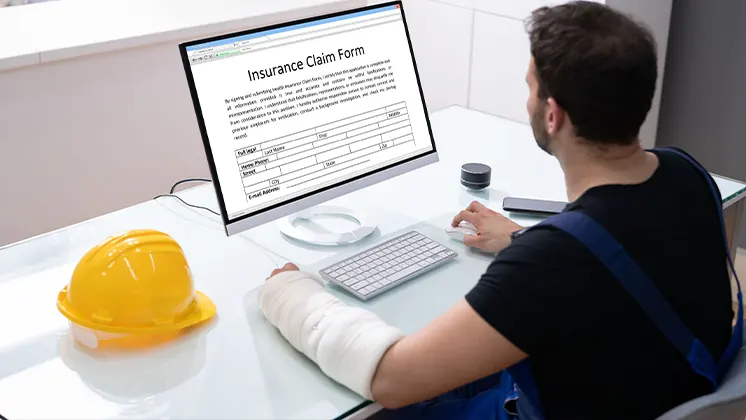How Does the Workers’ Compensation Settlement Process Work in Virginia?

If you have suffered a workplace injury in Virginia, you may be eligible to receive workers compensation benefits. These can include coverage for medical treatment and lost wages related to your injury. However, there may come a point where you and the insurance company agree to settle your claim with a one-off payment deal instead of weekly payments. This avoids having to deal with the workers’ compensation system on an ongoing basis.
Settling a workers compensation claim in Virginia is not as simple as reaching an agreement with the insurer. Certain steps must be taken for the settlement to become final. An experienced workers’ compensation attorney can provide invaluable help through this complex process.
What is a Workers’ Comp Settlement?
A workers compensation settlement is an agreement between an injured employee and the employer’s insurance company to end the case with the employee receiving a full payment deal. In return, the employee gives up the right to any further workers’ compensation benefits for that injury.
Settlements allow both parties to avoid the uncertainty of leaving a claim open. The employee gets an immediate payment rather than small amounts over time. The insurer can close its file and avoid possibly paying more down the road.
However, because a settlement ends all future benefits, it must provide adequate compensation. An injured worker should never attempt settlement negotiations without an attorney’s guidance.
When Do Workers’ Comp Cases Settle?
There is no set time frame for settling a claim. Some cases resolve within months, while others remain open for years. In general, the more serious or complex an injury, the longer settlement may take.
The most common scenario for settlement is when an employee reaches maximum medical improvement (MMI). This is the point when doctors determine the injury has healed as much as it is going to. If the worker is left with permanent impairment, a settlement may be appropriate.
Settlement also often happens when an employee cannot return to their old job. If the insurer accepts that the worker likely qualifies for permanent disability benefits, it may offer a lump sum to close the claim.
Workers’ Comp Settlement Process Overview
Reaching a settlement agreement with the insurance company is only the first step. The deal does not become final until approved by the Virginia Workers’ Compensation Commission (VWCC).
The typical settlement process includes:
- Negotiating an agreement with the insurer
- Drafting settlement documents for the Commission review
- Submitting required supporting evidence
- Securing approval by a Deputy Commissioner
- Receiving and disbursing the settlement payment.
This process provides necessary oversight to protect the interests of injured workers. It often takes 60 to 90 days from initial filing to final approval.
Having an experienced attorney guide you is extremely important. Let’s look at the settlement process in more detail.
Step 1: Negotiating a Settlement
The first part of the settlement process involves negotiating an agreement with the insurance company. There is often back and forth before both sides compromise on an amount.
Some key factors affect settlement amounts, including:
- Type and severity of injury
- Duration of lost work time
- Extent of permanent disability
- Need for ongoing medical care
- Lost earnings and impact on future employability.
An attorney considers these factors when assessing what constitutes fair compensation. The insurer almost always starts with a low offer. Your lawyer works to negotiate the highest possible settlement.
When an amount is agreed upon, the attorney drafts the legal documents to submit for Commission approval.
Step 2: Drafting Settlement Documents
Virginia workers’ compensation rules set forth specific documents needed to request approval of a settlement:
- Settlement Petition – Identifies the parties, outlines terms of the agreement, and requests Commission approval
- Settlement Order – Formal order for the Commission to sign approving the agreement
- Settlement Agreement – Spells out the terms of settlement and compensation to the employee
- Affidavit – Sworn statement by the employee explaining the settlement and verifying their wish for approval
- Confidential Cover Letter – Prepared by the employee’s lawyer, meant to be read only by the judge or Deputy Commissioner.
Additional items also required in the package submitted to the Commission include:
- Current medical records
- Itemized list of expenses and payments already made on the claim
- Breakdown of the settlement amount and disbursement plan.
It’s vital to ensure that this documentation follows precise Commission guidelines. Any technical errors can delay approval.
Step 3: Submitting Evidence to Support Settlement Approval
When requesting settlement approval, the injured worker’s attorney must submit substantial evidence about the claim. This allows the Commission to assess whether the proposed agreement adequately compensates the employee.
Required evidence includes current medical records and doctors’ evaluations of the worker’s condition. This shows the status of recovery and any permanent impairment resulting from the injury. Also necessary are wage records, details of benefits paid so far, and vocational assessments if relevant. Anything relating to the worker’s ability to return to employment must be provided.
Get an experienced workers compensation lawyer to assist you in compiling, organizing, and properly submitting this evidence. Your attorney can help ensure your supporting documents are compelling enough to get approval.
Step 4: Securing Approval by a Deputy Commissioner
Once the settlement petition and supporting documentation are filed with the VWCC, the request goes to a Deputy Commissioner. This judge-like official reviews everything submitted about the proposed agreement.
The Deputy Commissioner must determine if the settlement adequately compensates the injured worker based on Virginia law. They assess medical evidence regarding the extent of disability and future medical needs. If the Deputy Commissioner finds the agreement fair and reasonable, they will approve it. If not, they can request more evidence or reject the settlement.
Securing approval of a workers compensation settlement is challenging without an attorney who is well-versed in this process. The Slominski law firm guides you at each step and works to preempt potential issues.
Step 5: Receiving and Disbursing the Settlement Funds
After the Deputy Commissioner approves a settlement, the Order gets sent to the parties. At this point, the insurer must release the agreed payment amount.
By law, the worker’s attorney receives the check directly and distributes payment according to the approved agreement. Recipients typically include medical providers, the attorney, and the employee. Any other potential liens should be resolved with the attorney’s assistance before the worker receives their share.
As you can see, you get important protection if you have an attorney overseeing the accounting and disbursement of settlement payments. It ensures you receive what you are owed without any complications.
Key Considerations Regarding Workers’ Comp Settlements
Settling a workers compensation claim requires weighing several important factors. An experienced attorney should give you crucial advice on how these issues apply to your situation and potential settlement.
Release of All Future Benefits
The key thing to understand about settlement is that it ends all possibility of any future benefits. Once approved, the workers compensation case permanently closes. You forfeit rights to additional lost wage payments or coverage for medical costs. Make sure settlement adequately covers your potential future medical needs and impact on earning capacity.
Attorney’s Fees
By law in Virginia, attorney fees on workers compensation settlements are limited to 20% of the total amount. Also, expenses incurred get reimbursed to the law firm from the settlement funds.
Ensure you understand exactly what you will net. A reputable attorney provides a clear written breakdown of the disbursement.
Tax Consequences
Workers’ compensation settlements may have tax implications that reduce what you actually take home. Consider getting advice from a financial professional about minimizing taxes. Also discuss with your attorney how to structure the settlement to protect the most funds possible. A competent lawyer stays aware of the latest tax laws affecting settlements.
Medicare Set Asides
If you are receiving Social Security Disability benefits, Medicare may claim a right to part of your settlement. Called a Medicare Set Aside (MSA), this allocates funds to cover future injury-related medical costs.
Failing to properly establish an MSA when settling can cause you to lose Medicare coverage. An attorney handles technical details to avoid this serious consequence.
Lump Sum vs. Structured Settlement
Most workers’ compensation settlements pay the full amount in a lump sum. If you prefer not to receive all the money at once, there is another way to receive your settlement, which is called a structured settlement. It provides smaller payment amounts over an extended timeframe.
A structured settlement better protects funds if you worry about properly managing a large lump payment. Your attorney can advise which option makes most sense.
As you can see, settling a workers compensation claim requires great attention to legal and financial details. Consult with Slominski Law. Our experienced Virginia workers’ comp lawyer Jaleh K. Slominski is ready to guide you through the process, prevent missteps, and strategize for the most favorable outcome.
Why Do I Need an Attorney for My Worker’s Comp Settlement?
Given the complexities of the workers’ compensation settlement process, having an experienced attorney is extremely beneficial. A lawyer who focuses specifically on workers’ compensation understands how to navigate the system to your advantage.
A workers compensation attorney assists with your settlement by:
- Negotiating the best deal – Based on experience settling numerous cases, an attorney negotiates the maximum possible settlement from the insurer. This often results in significantly higher compensation compared to negotiating on your own.
- Handling all documentation – As outlined above, precise paperwork must get filed for the Commission to approve a settlement. An attorney ensures every document follows legal requirements.
- Compiling necessary evidence – This involves collecting, organizing, and presenting medical records and other evidence to justify the settlement terms. Your lawyer handles all these details.
- Communicating with the Commission – During the approval process, an attorney interacts with Commission staff to resolve any questions about the settlement request. This prevents delays or rejection.
- Advising on tax and financial implications – Knowledgeable attorneys consider how settlement structure and details impact your bottom line. This puts more cash in your pocket.
- Protecting your best interests – By law, the Commission must find a workers compensation settlement “fair, adequate and reasonable” before approving it. An attorney fights to ensure you get properly compensated for your injuries.
It’s a smart choice to have Slominski Law protect your rights through every step of the process. We have secured numerous sizable settlements for injured clients throughout western and central Virginia. For a free consultation about your worker’s compensation case, contact Slominski Law today at (434) 384-9400 (Lynchburg office) or (540) 554-3762 (Roanoke office).





